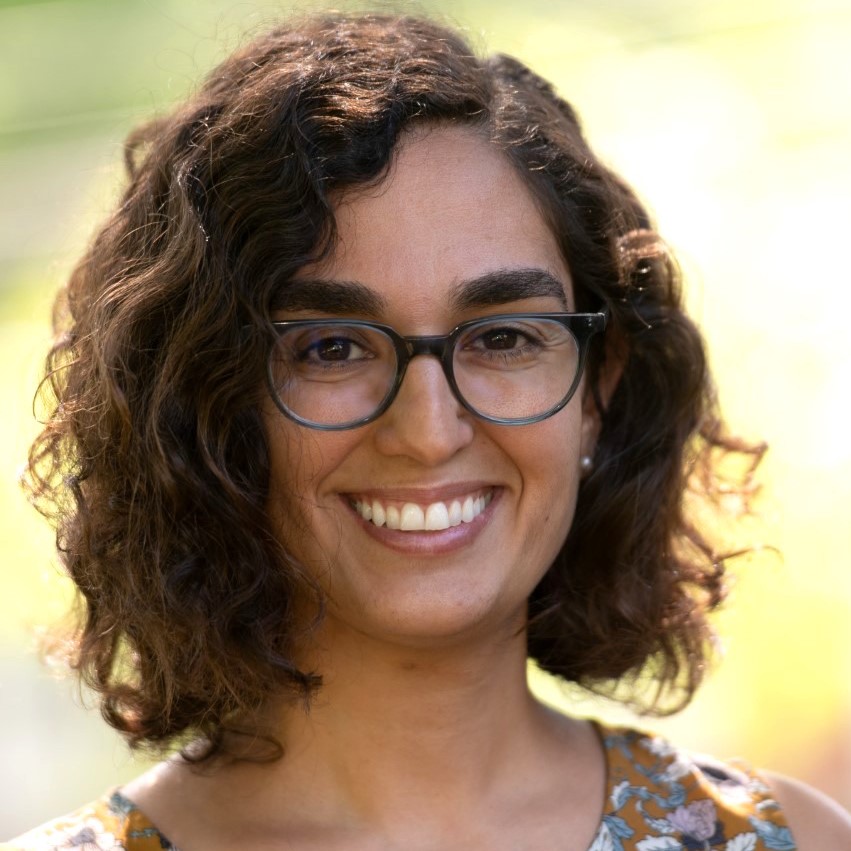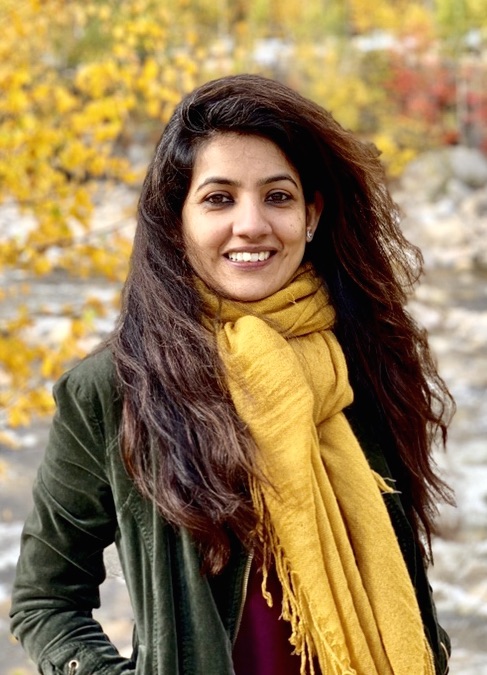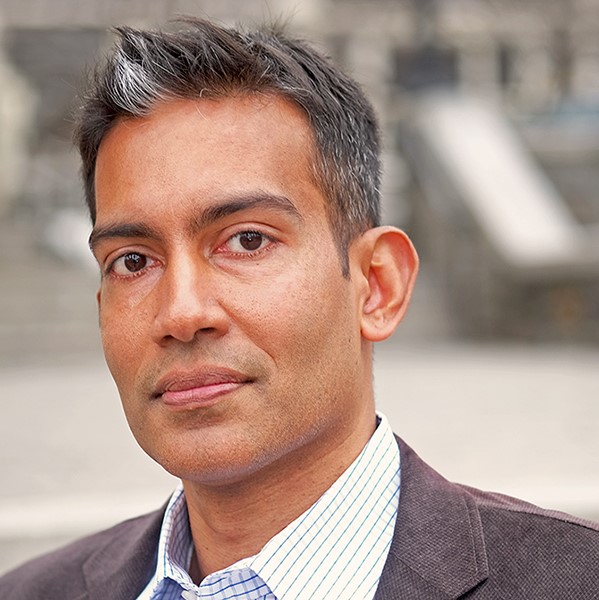This AAS Digital Dialogue is third in an ongoing series of discussions about topics in Critical Muslim Studies.
Friday, April 16, 2021
3:00-4:15pm Eastern Time
Writing, Educating, and Conceptualizing Muslims across Asia and Asian America
The third installment of an ongoing series of conversations on “Critical Muslim Studies” will focus on the topic of “Writing, Educating, and Conceptualizing Muslims across Asia and Asian America” with panelists Nadeen Kharputly, Maheen Haider, and Haleema Welji with moderator Stan Thangaraj.
Critical Muslim Studies (Part III) Session Transcript
Additional Resources
Akhtar, Ayad. American Dervish: A Novel. United States: Little, Brown, 2012.
Akhtar, Ayad. Disgraced: A Play. United States: Little, Brown, 2013.
Fatimah Asghar https://www.fatimahasghar.com/
Coleman, Marcus J.., Cubbage, Jayne., Cheung, Alison Yeh., Gonzalez de Bustamante, Celeste., Campbell, Christopher., Byrd, Robert D.., Cordes, Ashley. Media, Myth, and Millennials: Critical Perspectives on Race and Culture. United States: Lexington Books, 2019.
W.E.B. DuBois on Double Conciousness https://www.theatlantic.com/magazine/archive/1897/08/strivings-of-the-negro-people/305446/
Eteraz, Ali. Native Believer. Akashic Books, 2016.
Faizullah, Tarfia. Registers of Illuminated Villages: Poems. United States: Graywolf Press, 2018.
Faizullah, Tarfia. Seam. United States: Southern Illinois University Press, 2014.
Hamid, Mohsin. The Reluctant Fundamentalist. Canada: Doubleday Canada, 2009.
Abraham Joshua Heschel https://en.wikipedia.org/wiki/Abraham_Joshua_Heschel
Nadeen Kharputly. ‘Music: Hip-Hop and Rap: North America’. In Encyclopedia of Women & Islamic Cultures, edited by Suad Joseph, Afsaneh Najmabadi, Julie Peteet, Seteney Shami, Jacqueline Siapno and, and Jane I. Smith. doi:http://dx.doi.org/10.1163/1872-5309_ewic_COM_002128.
Kharputly, Nadeen. ” Whose Best Friend? Muslims, Dogs, and the Making of American Humanity”, Society & Animals (2020): 1-17, doi: https://doi.org/10.1163/15685306-BJA10016
Maira, Sunaina Marr. The 9/11 Generation: Youth, Rights, and Solidarity in the War on Terror. United States: NYU Press, 2016.
Maira, Sunaina Marr. Missing: Youth, Citizenship, and Empire After 9/11. United Kingdom: Duke University Press, 2009.
Viet Thanh Nguyen and Narrative Scarcity https://www.pw.org/content/narrative_scarcity
Shaista Patel https://ucsd.academia.edu/ShaistaPatel
Rana, Junaid. “The Racial Infrastructure of the Terror-Industrial Complex.” Social Text 34.4 (2016): 111-138.
Thangaraj, Stan. “Racing the Muslim: Strategies for Teaching Race and Ethnic Studies in the Education Curriculum.” Urban Education (2020).
Zakat https://en.wikipedia.org/wiki/Zakat
Guiding questions and issues included:
(From Haleema Welji)
What role does activism play in challenging stereotypes and assumptions about the category of “Muslim”?
In this talk, I will use my research and teaching to explore the contemporary role of activism in rejecting and challenging the essentialization and racialization of this category of “Muslim.” I will speak about my preliminary research with college-aged Muslim-American social justice activists to explain how they are both (1) drawing from Islam to ground their activism, but also (2) aligning Islam with broader categories of social justice work that reach across races, religions, sexual orientations, etc. What this work shows is a way in which definitions of “Muslim” and even “Islam” are moving targets and contextually defined.
Given the topic of the dialogue, “Writing, Educating, and Conceptualizing Muslims,” I also want to use my work of teaching and specifically teaching writing to think about the role of education in the social justice framework. Not only is access to “elite” education often a key site of exposure to social justice work, but it also challenges assumptions about activism more broadly—such as associations between activism and class or levels of education. A second challenge is to examine the multiple targets of activism, in which the targets of activism spans categories from those who perpetuate misinformation/Islamophobia to Muslims themselves.
(From Nadeen Kharputly)
This talk will highlight the tensions between artistic prerogative and the burden of representation faced by Muslim American authors and cultural producers. I will discuss a few different examples of tactics wielded by contemporary Muslim American authors and cultural producers to illustrate how they navigate the pressures of representation in a literary and cultural landscape that has been shaped by Islamophobia.
Session Speakers

Nadeen Kharputly
Visiting Assistant Professor in English at Washington and Lee University
Nadeen received her PhD in Literature from the University of California, San Diego. She is currently a Visiting Assistant Professor in English at Washington and Lee University, where she teaches 20th and 21st century American literature. She has previously taught in Ethnic Studies at UC San Diego. Her work appears in: The Encyclopedia of Women and Islamic Cultures; Media, Myth, and Millennials: Critical Perspectives on Race and Culture; and Society & Animals.
Her current book project is titled The Burden of Humanization: Race, Representation, and Responsibility in Muslim American Culture.

Maheen Haider
Ph.D. candidate in the Department of Sociology at Boston College
Maheen Haider is currently a Ph.D. candidate in the Department of Sociology at Boston College, where she studies issues of immigration, race and ethnicity. Her dissertation “Race, Religion, and Class at the Intersection of High-Skilled Immigration,” takes a comprehensive qualitative approach in understanding the contemporary contexts of US immigration from non-white, high-skilled, and Muslim perspectives. This work investigates their strategies of acculturation and integration in the political contexts of post-9/11, War on Terror era, and in the light of the recent travel bans aka Muslim ban. Beyond her dissertation, her research also examines racialized representations of Muslim identities across popular media, contributing to the knowledge of race, ethnicity, and media studies.
She is also the non-resident Immigration Initiative Harvard Fellow for the 2020/2021 academic year. and has been appointed as the Faculty in Residence at the Thea Bowman AHANA (people of African, Hispanic, Asian, and Native American descent) and Intercultural Center for the 2020/2021 Academic year at Boston College.

Haleema Welji
Lecturing Fellow in the Duke Thompson Writing Program
Haleema Welji is a Lecturing Fellow in the Duke Thompson Writing Program, where she teaches cultural and linguistic anthropology and writing. She received the 2020 Award for Excellence in Teaching Writing from Trinity College of Arts & Science at Duke University. Her most recent project explores questions of belonging, race, and reform through the lens of social justice activism amongst young Muslim-Americans. She is part of the Social Science Research Council’s Religion and the Public Sphere Summer Institute for Early-Career Scholars focusing on Religion and Social Justice Movements. She has a PhD in Linguistic Anthropology from the University of California, San Diego.

Stan Thangaraj
Associate Professor of Anthropology, Gender Studies, and International Studies at the City College of New York (CUNY)
Stanley Thangaraj is an Associate Professor of Anthropology, Gender Studies, and International Studies at the City College of New York (CUNY). His interests are at the intersections of race, gender, sexuality, and citizenship. He studies immigrant and refugee communities in the U.S. South to understand how they manage the black-white racial logic through gender and the kinds of horizontal processes of race-making. His monograph Desi Hoop Dreams: Pickup Basketball and the Making of Asian American Masculinity (NYU Press, 2015) looks at the relationship between race and gender in co-ethnic-only South Asian American sporting cultures. He has co-edited volumes: Sport and South Asian Diasporas (Routledge, 2014) and Asian American Sporting Cultures (NYU Press, 2016). His newest research is on Kurdish America, which received the 2015 American Studies Association “Comparative Ethnic Studies” award. He will be working on the ways that diasporic Kurds in the United States evoke the category of “Indo-European,” “Aryan,” and “woman” to talk about nation-state violence, offer counter-narratives to state histories, bind Kurdish-ness in relation to ethnic others, racialize other communities, and manage the global war on terror.

